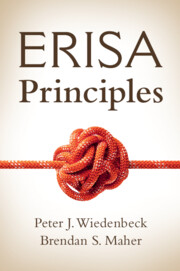Book contents
- ERISA Principles
- ERISA Principles
- Copyright page
- Contents
- Acknowledgments
- Table of Cases
- Table of Legislation
- Table of Rules and Regulations
- Part I General Considerations
- Part II Conduct Controls: Welfare and Pension Plans
- 3 Disclosure
- 4 Fiduciary Obligations
- 5 Enforcement
- 6 Preemption
- Part III Content Controls: Pension Plans
- Part IV Tax Controls: Qualified Retirement Savings
- Part V Health Plan Content Controls
- Appendix ERISA’s Legislative History
- Index
5 - Enforcement
from Part II - Conduct Controls: Welfare and Pension Plans
Published online by Cambridge University Press: 15 February 2024
- ERISA Principles
- ERISA Principles
- Copyright page
- Contents
- Acknowledgments
- Table of Cases
- Table of Legislation
- Table of Rules and Regulations
- Part I General Considerations
- Part II Conduct Controls: Welfare and Pension Plans
- 3 Disclosure
- 4 Fiduciary Obligations
- 5 Enforcement
- 6 Preemption
- Part III Content Controls: Pension Plans
- Part IV Tax Controls: Qualified Retirement Savings
- Part V Health Plan Content Controls
- Appendix ERISA’s Legislative History
- Index
Summary
ERISA’s underdeveloped civil enforcement mechanism, section 502(a), has generated extensive litigation. Judicially crafted strictures on the relief available to participants have arisen with respect to standing, scope of judicial review, causes of action, and remedies. While the Supreme Court has held those with a colorable claim to benefits have standing, precisely what that means has proven elusive. Judicial review of denied claims is strictly constrained. Court access requires that participants have exhausted internal review processes, and if the plan grants the administrator discretion to determine eligibility for benefits or construe the plan’s terms (which is virtually always), judicial review is restricted to a cursory scan for abuse of discretion. Deferential review survives even if the administrator is conflicted: lower courts are instructed to consider the conflict merely as one factor in and overall assessment of whether discretion was abused. Finally, the Court has held that ERISA does not permit the full panoply of damages one would expect in the aftermath of contractual or fiduciary breach. Consequential damages are unavailable for denied claims, and equitable relief for fiduciary breach is limited to what was typically available in equity in the days of the divided bench.
Keywords
- Type
- Chapter
- Information
- ERISA Principles , pp. 160 - 192Publisher: Cambridge University PressPrint publication year: 2024

